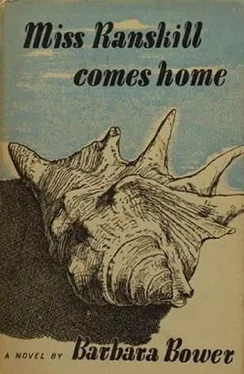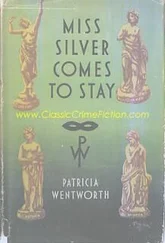‘You might try to think ,’ so Edith expostulated frequently, ‘I don’t want to seem disagreeable , but really it looks almost greedy to eat all your butter ration at one meal.’
‘It seems greedier to me to make such a fuss about it and niggle it out in tiny bits. When it’s there I eat it: when it’s finished I go without. I don’t want every day to be the same.’
‘But it makes it so awkward for us . Of course I’m delighted to share everything with you, but it’s different for Philippa and she notices .’
‘I don’t want her to, and she doesn’t want to. I don’t interfere with her everlasting bread-and-scrape; why should she bother if I butter half an inch thick one day and don’t butter at all the next?’
‘Because we happen to be living in civilised times.’
‘Do we?’ Miss Ranskill glanced at the headlines of the newspaper by her sister’s side.
After that, she ate dry bread on six days of the week, and on the seventh, after having annoyed her sister and Mrs Phillips by begging them to share her untouched butter ration, finished it off herself and piled marmalade on the top of it.
‘Can’t you see that it’s better,’ she insisted. ‘You must see it’s better to behave as if there wasn’t a war for one day in the week?’
But Mrs Phillips and Edith did not see. Since they must make sacrifices, they preferred to be sacrificed daily by slow stages.
The black-out provided more argument.
‘If we want to mislead the Germans and save our factory towns from bombardment, why can’t we illuminate the villages – different ones every night?’
‘Ours not to reason why,’ barked Mrs Phillips. ‘Ours but to do and die.’
‘But you’d be much more likely to die if you drew back the curtains,’ muttered Miss Ranskill, while Edith, who was always stirred to nervous bustling by the very mention of light, hurried away to make certain that no chink was showing between the bathroom window-frame and its curtain.
Miss Ranskill was quite aware that she was being difficult and tiresome. She tried to explain her points of view both to Edith and to the doctor, who had been called in to deal with her sleeplessness and frequent bouts of indigestion.
‘You see, I thought it was all going to be the same as usual, but now that I’ve arrived in this country, like a new girl coming to school in the middle of the term, I feel confused. I’d looked forward for years to new clothes and bed-and-bath luxuries, but everything I have must be rationed.’
‘But,’ expostulated Edith, ‘of course I’m sorry for you, but really it is the same for all of us. We’re all in this war together .’
‘That’s where you’re wrong: it isn’t the same for me. I’ve come from a primitive life where I’ve learned how to do without things you’d call necessities. I can still do without them easily. I can do without them here , just as I could do without them on the island. I can go barefoot–’
‘But nobody does.’
‘I can manage with two or three garments and very plain food, but I won’t fiddle and faddle and niggle and naggle, and make do and mend, and turn old petticoats into blouses when I’ve got two blouses already: it isn’t sense . And as for being in this war all together, we aren’t. In this village we’re just playing at it.’
‘I’m sure’ – if only Edith’s moustache had been a trifle heavier it would have bristled – ‘I’m sure I don’t play , Nona. I haven’t had an idle moment since the war began. I never allow myself to rest. If only you would take more interest in all the things that are being done in the village, you wouldn’t be so introspective and nervy.’
‘I do all I can in the garden: that seems more important to me than yattering at Committee Meetings.’
It was Doctor Fenton who had suggested garden work as a nerve-soother, and Miss Ranskill worked all day, and through the long light evenings, though every time she handled a spade she was reminded of the frayed paddle with which she had dug the Carpenter’s grave.
‘It should cure the sleeplessness in time,’ he said, ‘by taking your mind right away from the experiences you have had. Try to think of the garden when you go to bed at night. Don’t let your mind dwell on that island of yours.’
‘No,’ said Miss Ranskill, unable to explain that the island was the one place where she could lay her mind to rest to be lulled by the memory of gulls crying, while the waves lippited along the beach, and the uninterrupting voice of the Carpenter boomed a rather tuneless song.
After the doctor had suggested light nourishing food, and mentioned the suitability of whiting steamed in milk, and had added that in normal times he would have recommended a sea-voyage, Miss Ranskill did not mention her sleeplessness again. He was a kind man. Edith was a kind woman, but incapable of understanding that if her sister could not have the gilt on her gingerbread, she would rather have bread and no ginger.
She grew a little more tired and a little thinner and a little more difficult day by day. Every evening she wrote a letter to the Carpenter’s wife. Every night between waking and sleeping she pictured the postman knocking on the door, she saw the letter being fingered and opened; and she heard it being read aloud to the boy, Colin. But every morning she tore up the letter and threw it into the waste-paper basket in Mrs Phillips’ spare room.
It was impossible to write: words would not carry the right picture. The story she owned was one that must be told by her under the roof that the Carpenter had raised, beside the hearth he had laid, by the light through the window that burnished the nasturtiums on the sill.
She must go soon, and the thought of her journey lifted her through the difficult days though she put off going and stored up the dream in her mind, perfecting it little by little and saving it as a refuge.
Sometimes she felt the delay was not quite fair to the Carpenter’s wife, who might, long ago, have lost hope, and might now be waiting empty-hearted for the gift that Miss Ranskill alone could bring, the gift of the days of her husband’s life.
Yet, surely, he could not have been dead to her through the years of his living; he had lived too strongly for that. Winds, blowing to England, must have carried his life’s breath with them for so long as it lasted. True, Edith had bought a memorial window for her sister; but the link between them had never been so strong as the one which must, surely, have bound the Carpenter’s wife to such a husband. So Miss Ranskill argued to herself night by night and day by day, fearful of admitting her ghost of a fear lest another dream should be tarnished or even broken.
The Carpenter’s cottage shone in her mind. There she might find peace and comfort and kindliness, all of them glowing as the flowers on the window-sill, homely as the little besom on the hearth.
She might even find some sort of work in the village, enough, at least, to pay for board and lodging in Mrs Reid’s cottage. Then there would be a welcome each night, and peace in which she could conjure up the island, and, word by word, restore the Carpenter to his wife and son.
You’ll not have to waste time in coming to see us, Miss Ranskill .
Yet, she was not wasting time, she was cherishing what time might bring.
It would not, she guessed, be possible to continue for very long as Mrs Phillips’ suffered guest.
In the evenings she had the middle chair before the fire, away from the light and beyond knee-warmth. She had the middle place at table, and the last bath at night. There was no hint of establishment.
Читать дальше












